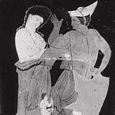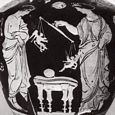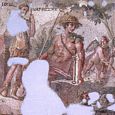ANTEROS
Greek Name
Αντερως
Transliteration
Anterôs
Latin Spelling
Anteros
Translation
Love Returned
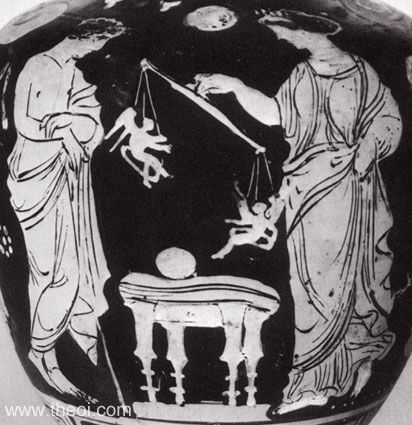
ANTEROS was the god of requited love and the avenger of the unrequited. He was numbered amongst the Erotes, winged godlings in the train of Aphrodite.
Anteros was often depicted opposite Eros on Aphrodite's scales of love.
FAMILY OF ANTEROS
PARENTS
[1.1] ARES & APHRODITE (Cicero De Natura Deorum 3.21)
[1.2] APHRODITE (Ovid Fasti 4.1,
Seneca Phaedra 274)
CLASSICAL LITERATURE QUOTES
Plato, Phaedrus 255d (trans. Lamb) (Greek philosopher C4th B.C.) :
"When he is with the lover, both cease from their pain, but when he is away then he longs as he is longed
for, and has love's image, Anteros (love against love) lodging in his breast, which he calls and believes to be
not love but friendship only, and his desire is as the desire of the other, but weaker; he wants to see him,
touch him, kiss him, embrace him, and probably not long afterwards his desire is accomplished."
Pausanias, Description of Greece 1. 30. 1 (trans. Jones) (Greek travelogue C2nd A.D.)
:
"Before the entrance to the Akademia (Academy) [outside Athens] is an altar to Eros (Love), with an
inscription that Kharmos (Charmus) was the first Athenian to dedicate an altar to that god. The altar within the
city called the altar of Anteros (Love Avenged) they say was dedicated by resident aliens, because the Athenian
Meles, spurning the love of Timagoras, a resident alien, bade him ascend to the highest point of the rock and
cast himself down. When Meles saw that Timagoras was dead, he suffered such pangs of remorse that he threw
himself from the same rock and so died. From this time the resident aliens worshipped as Anteros the avenging
spirit of Timagoras."
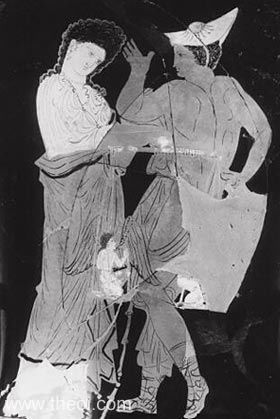
Pausanias, Description of Greece 6. 23. 5 :
"In one of the wrestling-schools [in the town of Elis] is a relief showing Eros (Love) and Anteros (Love
Returned), as he is called. Eros holds a palm-branch, and Anteros is trying to take the palm from him."
Aelian, On Animals 14. 28 (trans. Scholfield) (Greek natural history C2nd A.D.)
:
"Poseidon was the lover of Nerites [son of Nereus], and that Nerites returned his love, and that this was
the origin of the celebrated Anteros (Mutual Love)."
Ovid, Fasti 6. 90 (trans. Frazer) (Roman poetry C1st B.C. to C1st A.D.) :
"‘O [Venus-Aphrodite] gracious Mother of the Twin Cupides (Loves) [i.e. Eros and Anteros],’
said I, ‘grant me thy favour.’ The goddess looked back at the poet."
Cicero, De Natura Deorum 3. 21 (trans. Rackham) (Roman rhetorician C1st B.C.)
:
"The third [Cupid-Eros], who is the same as Anteros, [son] of Mars [Ares] and the third Venus
[Aphrodite]."
Seneca, Phaedra 274 ff (trans. Miller) (Roman tragedy C1st A.D.) :
"Thou goddess [Aphrodite], born of the cruel sea, who art called mother of both Cupides (Loves) [i.e. Eros
and Anteros], that wanton, smiling boy of thine."
Nonnus, Dionysiaca 47. 332 ff (trans. Rouse) (Greek epic C5th A.D.) :
"[Ariadne laments after being abandoned by Theseus on the island of Naxos :] ‘Are the very images of
Eros (Love) and Anteros (Love Reutrned) jealous of me? For I saw a deslightful vision of marriage accomplished
in a deceitful dream, and lovely Theseus was gone.’"
ANCIENT GREEK & ROMAN ART
SOURCES
GREEK
- Plato, Phaedrus - Greek Philosophy C4th B.C.
- Pausanias, Description of Greece - Greek Travelogue C2nd A.D.
- Aelian, On Animals - Greek Natural History C2nd - 3rd A.D.
- Nonnus, Dionysiaca - Greek Epic C5th A.D.
ROMAN
- Ovid, Fasti - Latin Poetry C1st B.C. - C1st A.D.
- Cicero, De Natura Deorum - Latin Rhetoric C1st B.C.
- Seneca, Phaedra - Latin Tragedy C1st A.D.
OTHER SOURCES
Other references not currently quoted here: Achilles Tatius 1.9, Themistes Orationes 24.305a.
BIBLIOGRAPHY
A complete bibliography of the translations quoted on this page.
